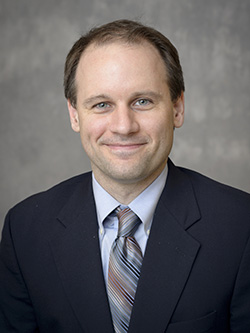Returning safe waters to Paradise

In November 2018, California's deadliest and most destructive wildfire burned nearly 240 square miles in the Sierra Nevada foothills. The "Camp Fire" raged through the town of Paradise, killing at least 86 people and destroying most buildings and infrastructure.
In particular, the firestorm ruined water pumps, hydrants — and miles of underground pipelines, which depressurized in the intense heat. Toxic chemicals from burnt materials and melted pipes seeped into the water system, where the liquid sat for weeks.
One year later, the biggest problem in Paradise? A contaminated water infrastructure.
For help, officials in the Paradise Irrigation District turned to an authority on restoring water infrastructure post-disaster: Andrew Whelton, associate professor in Purdue's Lyles School of Civil Engineering and Environmental and Ecological Engineering.
Whelton and his team of students and faculty, which includes Caitlin Proctor, a Lillian Gilbreth postdoctoral fellow, set out to help the utility restore safe water to Paradise.
"Early on, we contributed directly," Whelton says. "We provided an understanding of chemistry, water testing, contamination, damage assessment and a number of other issues. It all boiled down to science."
Proctor's research interests include microbiology, drinking water quality and building plumbing.
She emphasizes that practicing engineers be able to recognize the limits of the data and the knowledge they have. "Even with a PhD, I am regularly asking questions. Luckily, at Purdue, it’s easy to find the right expertise," she says.
During three visits to the Paradise area in 2019, Whelton's team surveyed the damage, met with officials, attended and held public meetings, and trained survivors about plumbing safety.

Andrew Whelton, associate professor of civil engineering and environmental and ecological engineering
Long, complex, expensive
"City and utility officials know that characterization and recovery is a monumental effort," Whelton says. "We walked them through a process of removing and replacing assets, and we came up with a timeline of two or three years to restore the water network. And that's an expedited timeline."
To be surveyed and tested are more than 172 miles of buried lines, more than six miles of plastic pipes, 1,400 hydrants with gaskets and 10,000 service connections.
Local leaders estimate a $53 million cleanup cost, but Whelton and his colleagues believe that figure is low. Until officials obtain a sufficient number of water samples, it's impossible even to determine the extent of the damage.
Although most people have left Paradise (at least temporarily), remaining residents still view Whelton as a resource. People email and phone him, asking for technical advice about their water. "We've refocused our efforts to help the community directly," he says.
In April 2019, Whelton's team surveyed homes in the Camp Fire area. Results showed that six months after the fire, about half of respondents reported anxiety, stress and depression related to drinking water contamination. Most did not know if their plumbing was safe or how to test it. The Purdue team organized a community event in July to teach fire survivors about plumbing issues. On hand were colleagues from University of California, Berkeley; Chico State University; Butte College; and the Paradise community.
Training future engineers
Whelton believes we need engineers trained to address situations where no scientific data is available. "When agencies and practicing engineers are faced with a scenario where there is no script, unfortunately, you see decisions that fail to protect public health," he says.
"At Purdue, we bring real-world issues into the classroom and student research so students can see for themselves how complex the issues are. From a scientific perspective, from a policy perspective, and from a human perspective."
